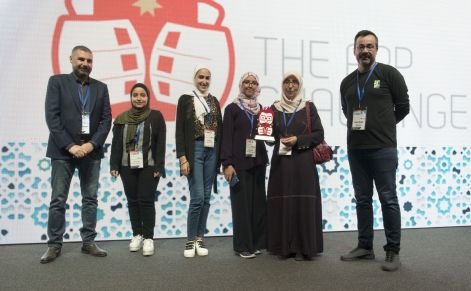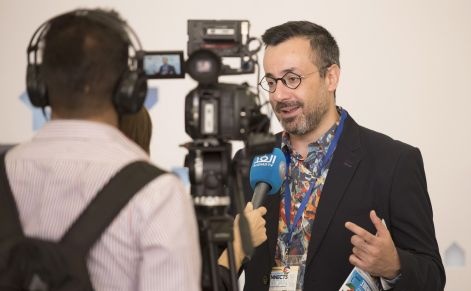This is the first in a series of interviews, videos and profile pieces exploring the huge potential of the Middle East and North African games market. And we’re thrilled to be launching with regular contributor Nour Khrais, founder and CEO of developer Maysalward and chairman of the Jordan Gaming Task Force.
The pandemic-inspired growth in Western markets seems to be slowing, but meanwhile, the MENA market is the fastest growing scene in games.
The region expects a boost in its player base of over 8.2% this year, and all aspects of the ecosystem are expected to drive $5 billion of revenue in the next three years. The median age in Jordan is less than 24 years, compared to over 38 in the US, meaning that there is a youthful population ready to embrace technology.
In November, Pocket Gamer Connects Jordan will return to Amman, and this gives us an unrivalled opportunity to dive into the region’s strengths and challenges.
“Life is back, and we are able to reconnect our Jordanian and MENA region developers with other parts of the world physically,” says Khrais, on the subject of conferences. “Online and video conferencing are great, but this face-to-face element and body-language communication can’t be replaced or transferred by any means. In addition, it is fun to see industry friends and party with them again.”
PocketGamer.biz: What is your background in the games industry?
Nour Khrais: Following my graduation from Jordan University in 1999, I began my career at a mobile value-added services startup called info2cell, which was acquired by Italian group Acotel in late 2003. I worked on content business development there for two years.
The most important thing I’ve learned from my mobile gaming journey is that you must keep learning to grow
Nour Khrais, Maysalward
In the years following info2cell, I worked for an Egyptian ISP startup called Yalla.com, expanding the company’s monetization and content creation efforts into online and mobile services.
In early 2002, I moved to Qatar to work with Nokia distribution partner: Consolidated Gulf. From there, I got the opportunity to work with a leading mobile platform and technology provider called Swapcom in France, which Swiss group Sicap acquired in 2006. During this journey, I gained a lot of content knowledge and built strong relationships with telco operators and handset manufacturers.
I attended a workshop in Paris in early 2003 about value-added services and the future of mobile content. The speaker discussed the predicted future of mobile games and how they will play a significant role in value-added services. It was this info chart, along with my childhood love of handled games, that sparked my entrepreneurial spirit and provoked me to begin looking into building my mobile game studio.
After researching for several months and continuing to save money to start my startup, I launched Maysalward in Nov 2003 to be the first mobile game studio in the Middle East and North Africa.
In 2004, the team launched the first Arabic mobile game, Trix, with one of the leading telecom operators in Jordan. The game was followed by another local game called Tawla [a form of backgammon] preloaded with Siemens devices.
Now, 20 years later, we are still building and publishing unique mobile games and enjoying every moment. The most important thing I’ve learned from my mobile gaming journey is that you must keep learning to grow and sustain your operation.
What makes Maysalward unique? What’s your special ingredient?
The hard work and dedication of our ambitious team are what makes our company unique. Our secret ingredient is passion combined with a deep understanding of R&D.
We all share the same goals: to achieve happiness and success and to bring that happiness, success and value to our players.
What are the big opportunities in Jordan when it comes to gaming?
Jordan is the MENA region access point. It is the gateway to over 65 million Arabic-speaking gamers.
Jordan’s geographical and political stability makes it an attractive place to establish development studios and publishing houses to localize and culturalise content. Additionally, Jordan is working to encourage foreign investment through tax-free technological parks. All powered by Jordan’s well-known human resources and engineering skills.
The whole MENA region is growing fast in games. How did this market become such a focus recently?
This is part of a regional vision and agreement to invest in youth, as this area has the highest youth population worldwide. There is a growing demand among today’s youth for technological savvy, and it’s an excellent opportunity for business growth.
We believe that there is a growing demand for culturally relevant content in the region. This content can be developed in the region or brought to players from all over the world. We believe that this content will help to attract more international companies and e-sport players to our region and help to grow our economy.
Jordanians are passionate about technology, and universities have been incorporating VR/AR since they emerged
Nour Khrais, Maysalward
What advice do you have for someone from Europe, America or Asia looking to make it in the MENA games industry?
Don’t hesitate. The region is business-friendly, and the opportunities are endless. You won’t think twice about pushing your product more in the region if you look at the year-on-year mobile growth, gaming, and the youth population.
What trend in games in the last year do you find most interesting?
The rise of the metaverse and the potential for it to become a premier platform for online gaming is what I am observing in the past two years.
Jordanian developers are passionate about technology, and our universities have been incorporating VR/AR into their curricula since the technologies emerged. Developers and businesses are also developing products incorporating mixed reality. In the upcoming years, the creative industry cluster hopes to have the government fully support metaverse inclusion as part of the country’s major plans for the future. This includes blockchain and NFTs.
What are the biggest challenges facing the global games industry in the next year? How will Jordan face them?
The industry always struggles with funding and self-funded studios, as the economy worldwide is struggling. We are worried that this will impact the user base revenues and also the potential of increasing funds or investment. But I am always optimistic when it comes to gaming, and I think we will manage this roller-coaster ride again.
If you’re not yet a registered Pocket Gamer Connects Jordan attendee, get on board: tickets are available now at Early Bird rates. The conference will take place near Amman, next to the Dead Sea. It will feature a range of top international speakers, plus opportunities to meet the local games industry and explore the region.








